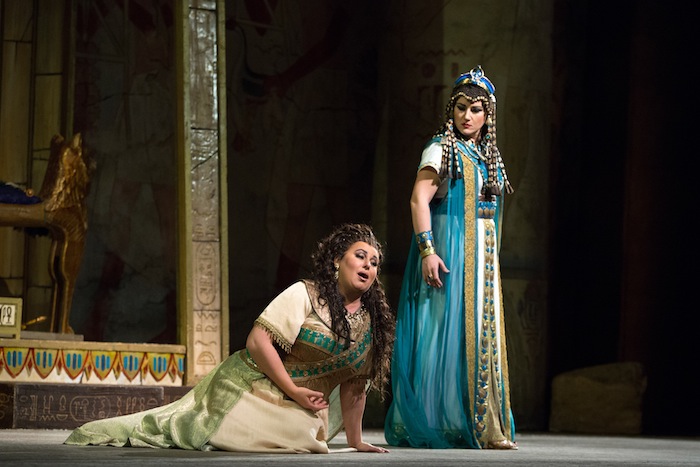Met’s sturdy “Aida’ delivers the Verdian goods

Liudmyla Monastyrska in the title role and Ekaterina Gubanova as Amneris in Verdi’s “Aida” at the Metropolitan Opera. Photo: Marty Sohl
Sonja Frisell’s production of Aida is surely one of the Metropolitan Opera’s most reliable moneymakers, its glamorous spectacle and Verdi’s beloved score serving as powerful draws to mavens and neophytes alike. Saturday’s season premiere was no exception, bringing in a healthy crowd for a noon matinee.
The cast was among the better ones that the company has managed to field for recent Aida revivals, though not without its shortcomings. Marco Berti, the veteran lyric tenor turned in a stronger performance than he has of late, bringing considerable vocal power to the heroic role of Radames. He still has a tendency to shout through much of his role, lacks much of a low register, and turns breathy when he tries to sing softly. On this occasion at least he managed to sing the punishing role in tune and without breaking, which is itself a feat.
Opposite him in the title role was Liudmyla Monastyrska, reprising the role with which she made her house debut in 2012. She, too, was much improved this time around, bringing vocal consistency and sensitive phrasing to her part. She had a tendency to retreat into vague physical gesture and some of her early work had more a feeling of recitation than of interpretation. As the opera progressed, however, she found her character, showing a strong defiant spirit in her Act II confrontation with Amneris, and giving a sincere, affecting account of Aida’s signature aria, “O patria mia.”
As has often been the case in Met Aidas lately, it was the supporting characters who gave the most compelling performances, starting with Ekaterina Gubanova’s captivating Amneris. Though somewhat on the small side for the Met, her gleaming mezzo-soprano carries thanks to its clarity, and its fiery quality lends fascinating color to all of her singing. She was a formidable presence as the haughty heiress presumptive, showing a fierce side in her dealings with her rival Aida. Her emotionally demanding scene in Act IV, in which her anger in dealing with Radames turned quickly into sighs of despair, was moving, and beautifully sung.
Mark Delavan’s warm, bristling baritone made him an imposing Amonasro, and for all his uncompromising pragmatism, his patriotic yearning came off sympathetically. Reprising his debut role, Solomon Howard growled magnificently as the King. His voice doesn’t boom, exactly, but his rich tone and grand bearing made him an authoritative presence. Turning a comprimario role into a highlight, Dmitry Belosselskiy was superb as the high priest Ramfis, sporting a deep, robust voice with gristly tone.
The ever-dependable Marco Armiliato led a tight performance from the pit, managing the massive score with skill and style. His approach to Verdi’s music was perfectly balanced, at once sumptuous and lively, grand but not glacial. Donald Palumbo’s chorus was, of course, impeccable, whether making a glorious clamor in the triumphal march or whispering with reverent tenderness in Ptah’s temple.
Aida runs through April 20 at the Metropolitan Opera. Latonia Moore sings the role role beginning November 22. A second cast starring Krassimira Stoyanova and Jorge de Leòn performs beginning March 23. metopera.org





